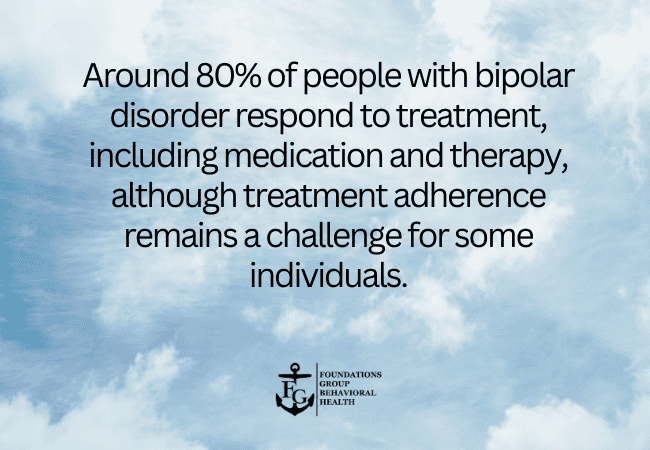Bipolar disorder is a complex and often misunderstood mental health condition that causes extreme fluctuations in mood, energy levels, and behavior. These mood swings can range from euphoric highs, known as manic or hypomanic episodes, to debilitating lows, or depressive episodes. This disorder can severely impact one’s ability to function in daily life, including relationships, work, and self-care, making it crucial for individuals to receive appropriate treatment. At Foundations Group Behavioral Health, we specialize in providing comprehensive treatment options to help individuals with bipolar disorder manage their condition and lead healthier, more balanced lives.
Understanding Bipolar Disorder: What Are the Symptoms?
Bipolar disorder is characterized by mood episodes that involve periods of both extreme highs (mania or hypomania) and extreme lows (depression). These mood shifts can occur unpredictably, often disrupting an individual’s life. Below are the core symptoms of each phase:
Manic Episodes
During manic episodes, individuals experience an elevated, euphoric, or highly irritable mood that lasts for at least one week. Symptoms of mania may include:
- Increased energy and activity: A person may feel unusually energetic, restless, or agitated.
- Reduced need for sleep: Individuals may feel rested after only a few hours of sleep or may not feel the need to sleep at all.
- Grandiosity: A sense of inflated self-esteem or unrealistic beliefs about one’s abilities.
- Racing thoughts: Thoughts may move quickly, making it difficult for the person to concentrate.
- Impulsivity and poor decision-making: This may include risky behaviors such as overspending, reckless driving, or engaging in unsafe sexual activities.
Hypomanic Episodes
Hypomania shares many of the same symptoms as mania, but the effects are less severe. People experiencing hypomania may function relatively well in daily life, though they may still make impulsive decisions or engage in risky behaviors. Hypomanic episodes typically last for at least four days and do not require hospitalization.
Depressive Episodes
Depressive episodes in bipolar disorder can be just as disruptive, if not more so, than manic episodes. These periods of deep sadness and hopelessness can last for at least two weeks and are characterized by:
- Feelings of worthlessness or guilt: Individuals may feel inadequate, worthless, or excessively guilty about things that are not their fault.
- Fatigue and lack of energy: Even simple tasks may feel exhausting or overwhelming.
- Changes in appetite or weight: There may be a significant increase or decrease in appetite.
- Sleep disturbances: Insomnia or excessive sleeping are common.
- Difficulty concentrating: Individuals may have trouble focusing on tasks, even those they once enjoyed.
- Suicidal thoughts or behaviors: In the most severe cases, individuals may experience thoughts of death or suicide.
Mixed Episodes
Some people with bipolar disorder experience mixed episodes, where symptoms of both mania and depression occur simultaneously. This can cause a confusing and intense emotional experience, and may result in increased irritability, agitation, and a higher risk of impulsive or reckless behavior.
Types of Bipolar Disorder
Bipolar disorder is categorized into several types, each with its own specific symptoms and characteristics:
1. Bipolar I Disorder
Bipolar I disorder is characterized by at least one manic episode lasting at least seven days or by manic symptoms that are so severe hospitalization is required. Depressive episodes are also common and typically last at least two weeks.
2. Bipolar II Disorder
Bipolar II disorder involves a pattern of depressive episodes and hypomanic episodes but no full-blown manic episodes. The severity of mood episodes in bipolar II disorder can vary significantly.
3. Cyclothymic Disorder (Cyclothymia)
Cyclothymic disorder is a milder form of bipolar disorder. It is characterized by periods of hypomanic symptoms and depressive symptoms that last for at least two years but do not meet the criteria for a full manic or depressive episode.
4. Other Types
In some cases, bipolar disorder may be triggered or influenced by medical conditions (e.g., thyroid disorders) or substance abuse, resulting in variations of the disorder that are treated in different ways.
What Causes Bipolar Disorder?
The precise causes of bipolar disorder are not fully understood, but several factors are believed to play a role in the development of the condition.
Genetic Factors
Research suggests that genetic inheritance plays a significant role in the development of bipolar disorder. People with a first-degree relative (such as a parent or sibling) with the disorder are at a higher risk of developing it themselves. Studies have found that bipolar disorder tends to run in families, though the exact genetic mechanisms remain unclear.
Neurochemical Imbalances
Neurotransmitters, which are chemical messengers in the brain, play a critical role in regulating mood, energy levels, and emotions. Imbalances in neurotransmitters like serotonin, dopamine, and norepinephrine are thought to contribute to the development of bipolar disorder. Research into these imbalances has helped shape treatment approaches, including medications designed to regulate neurotransmitter levels.
Environmental and Social Factors
Stressful life events, trauma, and substance abuse can act as triggers for the onset of bipolar disorder or an exacerbation of symptoms. Emotional or physical trauma, such as the death of a loved one, can increase vulnerability to developing the condition. Additionally, high-stress environments or major life changes can trigger manic or depressive episodes in individuals predisposed to the disorder.
How Is Bipolar Disorder Diagnosed?
Bipolar disorder is diagnosed by a mental health professional who will assess the individual’s medical history, symptoms, and family history of mental health conditions. The diagnostic process generally includes:
- Clinical Evaluation: A healthcare provider will conduct interviews with the patient and sometimes with family members to understand the patient’s symptoms and history.
- Physical Exams and Lab Tests: These may be done to rule out other potential causes of the symptoms, such as thyroid issues or substance use.
- Psychiatric Assessment: A thorough psychiatric evaluation may be conducted, including an assessment of cognitive functioning and emotional well-being.
Can I Live a Normal Life With Bipolar Disorder?
Yes, it is possible to live a normal, fulfilling life with bipolar disorder, especially when the condition is properly managed. While bipolar disorder presents significant challenges, many individuals with the disorder are able to lead successful lives with the right treatment and support system in place. Here are some important points to consider when thinking about living with bipolar disorder:
1. Effective Treatment Makes a Difference
Treatment for bipolar disorder can help individuals manage the condition effectively and maintain emotional stability. With a combination of medication and psychotherapy, people with bipolar disorder can experience fewer and less severe mood swings. The goal of treatment is to reduce the frequency and intensity of both manic and depressive episodes, helping individuals lead more consistent and productive lives.
2. Supportive Relationships Matter
Strong relationships with family, friends, and mental health professionals can provide emotional stability and encourage adherence to treatment. Support systems are crucial in helping individuals cope with the challenges of bipolar disorder, particularly during times of mood swings or life stressors. Having a support network can help prevent isolation and encourage healthy coping strategies.
3. Lifestyle Adjustments Help Manage Symptoms
Certain lifestyle choices can contribute to managing bipolar disorder and minimizing the frequency of mood episodes. Maintaining a routine with consistent sleep patterns, exercising regularly, eating a balanced diet, and reducing stress can help stabilize mood fluctuations. Regular monitoring of symptoms, along with strategies to address early warning signs of mood shifts, can also be effective in preventing full-blown episodes.
4. Work and Personal Life
While bipolar disorder may affect work and personal life, many individuals can still succeed in both areas with proper treatment. It may require adjustments, such as taking regular breaks or seeking flexible work arrangements, but many people with bipolar disorder continue to excel in their careers. The key is managing the condition proactively and creating an environment that supports emotional well-being.
5. Recovery is a Lifelong Journey
Living a “normal” life with bipolar disorder is a lifelong journey, as the condition requires ongoing treatment and self-management. Regular therapy sessions, medication adherence, and consistent monitoring are vital for maintaining stability. With the right tools, individuals with bipolar disorder can experience lasting stability and quality of life.

How is Bipolar Disorder Treated?
Bipolar disorder is a treatable condition, and a well-rounded treatment plan can significantly improve symptoms, reduce episodes, and help individuals live balanced lives. The treatment approach for bipolar disorder typically includes a combination of medication, psychotherapy, and lifestyle adjustments. Below are the primary treatment methods used to manage bipolar disorder:
1. Medications
Medications are often the cornerstone of bipolar disorder treatment. Different types of medications may be used depending on the individual’s symptoms, the type of bipolar disorder, and their medical history. Common medications include:
- Mood Stabilizers: These are the most commonly prescribed medications for bipolar disorder. They help control the manic and depressive episodes that characterize the disorder. Lithium is one of the most well-known mood stabilizers.
- Antipsychotic Medications: These are used to manage manic episodes or symptoms of psychosis (e.g., delusions or hallucinations) that can occur in severe cases of bipolar disorder.
- Antidepressants: These may be prescribed to help with depressive episodes. However, they are typically used in combination with mood stabilizers, as they can sometimes trigger a manic episode if used alone.
- Anti-anxiety Medications: If anxiety is a significant issue for the individual, medications such as benzodiazepines or selective serotonin reuptake inhibitors (SSRIs) may be prescribed alongside other treatments.
Medication must be carefully managed by a doctor, as different medications can interact with each other, and the dosage may need to be adjusted over time.
2. Psychotherapy (Talk Therapy)
Psychotherapy, or talk therapy, is an essential part of treating bipolar disorder. It provides individuals with coping strategies to manage stress, regulate emotions, and identify early warning signs of mood shifts. Key forms of psychotherapy include:
- Cognitive Behavioral Therapy (CBT): This form of therapy helps individuals identify negative thought patterns and replace them with healthier ways of thinking. CBT can help individuals with bipolar disorder cope with emotional challenges, develop problem-solving skills, and manage the stresses that might trigger mood swings.
- Interpersonal and Social Rhythm Therapy (IPSRT): This form of therapy focuses on stabilizing daily routines, such as sleep patterns and social rhythms, which can play a significant role in managing bipolar disorder. The therapy helps individuals develop consistent schedules, which can prevent mood episodes from being triggered by disruptions in their routine.
- Family-Focused Therapy (FFT): Involving family members in treatment can improve communication, enhance support systems, and reduce stress within the household. Family members learn about the condition, which helps them provide better support to the individual with bipolar disorder.
3. Psychiatric Day Treatment and Half Day Treatment Programs
For individuals who require intensive support but are not in need of inpatient hospitalization, psychiatric day treatment and half-day treatment programs can be effective. These programs offer structured therapy and psychiatric support during the day, while allowing the individual to return home in the evening. These programs often include a mix of individual and group therapy, medication management, and psychoeducation.
4. Outpatient Mental Health Programs
Outpatient programs are ideal for those who can manage their daily lives while continuing treatment. Outpatient programs focus on therapy, medication management, and peer support. These programs are often used as part of long-term care for bipolar disorder, helping individuals maintain stability after they’ve been stabilized in more intensive treatment settings.
5. Lifestyle Changes
In addition to therapy and medications, lifestyle changes play an important role in managing bipolar disorder. Creating a balanced routine that includes regular sleep, exercise, and nutrition can have a positive impact on emotional regulation. Reducing stress through mindfulness practices, yoga, and meditation can also help stabilize mood swings.
- Regular Sleep Patterns: Bipolar disorder is often associated with significant sleep disturbances. Both manic and depressive episodes can be triggered or worsened by disrupted sleep. Establishing a regular sleep schedule is critical for stability.
- Exercise and Healthy Diet: Regular physical activity has been shown to improve mood, reduce anxiety, and improve overall mental health. A balanced diet that supports brain health can also be beneficial.
- Stress Management: Learning to manage stress through relaxation techniques, such as deep breathing exercises or mindfulness meditation, can help minimize the risk of triggering mood swings.
6. Co-Occurring Disorder Treatment
Many individuals with bipolar disorder also experience other mental health conditions, such as anxiety disorders, depression, or substance use disorders. In these cases, integrated treatment for co-occurring disorders is crucial. A Co-Occurring Disorder Treatment Program can provide specialized care for individuals dealing with both bipolar disorder and another condition, ensuring that both are treated simultaneously for better long-term outcomes.
Treatment for Bipolar Disorder at Foundations Group Behavioral Health
While bipolar disorder cannot be cured, effective treatment can help individuals manage their symptoms and lead fulfilling lives. Foundations Group Behavioral Health offers a variety of comprehensive treatment options for people with bipolar disorder, tailored to each individual’s needs and stage of recovery.
Psychiatric Day Treatment and Half Day Treatment Program
For those who need intensive support but still wish to return home at night, our Psychiatric Day Treatment and Half Day Treatment Program provide structured, supportive environments. These programs focus on symptom stabilization through medication management, therapy, and social support, helping individuals develop the skills to manage their condition.
Outpatient Mental Health Program
Our Outpatient Mental Health Program offers flexibility for individuals who can manage their condition outside of a structured environment. This program combines therapy (e.g., Cognitive Behavioral Therapy, Dialectical Behavioral Therapy) with medication management to help individuals address mood swings, reduce the risk of relapse, and improve overall emotional regulation.
Anxiety Treatment Program and Depressive Disorder Treatment Program
Bipolar disorder is often accompanied by anxiety and depression. Our Anxiety Treatment Program and Depressive Disorder Treatment Program are designed to help individuals address these co-occurring conditions through evidence-based therapies. These treatments focus on reducing negative thought patterns, improving coping strategies, and addressing the root causes of anxiety and depression.
Sleep Disorder Treatment Program
Sleep disturbances are common among individuals with bipolar disorder, often exacerbating mood episodes. Our Sleep Disorder Treatment Program helps individuals develop healthy sleep habits and address underlying sleep issues through cognitive therapy and lifestyle changes.
Trauma Disorder Treatment Program
Many individuals with bipolar disorder have experienced trauma, which can trigger or worsen symptoms. Our Trauma Disorder Treatment Program helps patients process and heal from traumatic experiences through therapies such as trauma-focused CBT, EMDR, and mindfulness techniques.
Co-Occurring Disorder Treatment Program
Many individuals with bipolar disorder also struggle with substance use issues or other mental health conditions. Our Co-Occurring Disorder Treatment Program addresses these dual diagnoses simultaneously, providing an integrated approach to treatment that supports long-term recovery.
Conclusion
Bipolar disorder is a challenging and complex mental health condition, but it can be effectively managed with the right treatment. At Foundations Group Behavioral Health, we offer a range of comprehensive treatment programs, including Psychiatric Day Treatment, Outpatient Mental Health Programs, and specialized care for anxiety, depression, trauma, and co-occurring disorders. By addressing both the symptoms and underlying causes of bipolar disorder, we help individuals regain stability, improve their quality of life, and navigate the path to recovery. Contact us today at 508.388.5324 to book your first session and begin your journey toward a more mindful future.
FAQ for Bipolar Disorder
Can I live a normal life with bipolar disorder?
Yes, many individuals with bipolar disorder can lead fulfilling lives with proper treatment, including medication, therapy, and lifestyle adjustments. With a strong support system and effective management strategies, people with bipolar disorder can experience emotional stability.
How is bipolar disorder treated?
Treatment for bipolar disorder typically includes medication (such as mood stabilizers, antidepressants, and antipsychotic medications), psychotherapy (such as cognitive-behavioral therapy and interpersonal therapy), and lifestyle changes to manage stress and ensure emotional stability.
What causes bipolar disorder?
The exact cause of bipolar disorder is unknown, but it is believed to result from a combination of genetic factors, environmental influences, and disruptions in brain chemistry and structure. A family history of the disorder may increase the risk.
Can bipolar disorder be cured?
While there is no cure for bipolar disorder, it can be effectively managed with long-term treatment. With the right support, individuals can maintain emotional stability and minimize the impact of mood episodes.








